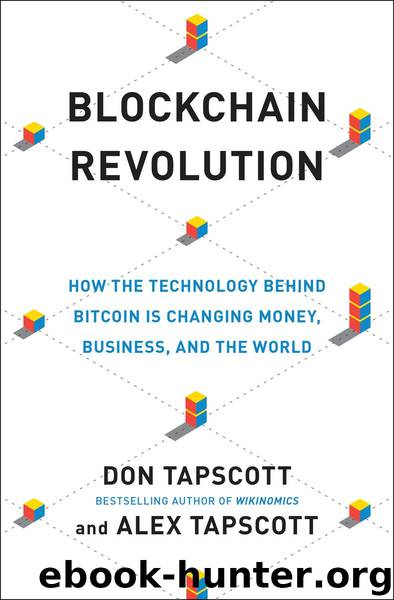Blockchain Revolution by Tapscott Don & Tapscott Alex

Author:Tapscott, Don & Tapscott, Alex
Language: eng
Format: epub, mobi
Publisher: Penguin Publishing Group
Published: 2016-05-09T16:00:00+00:00
The Prosperity Passport: An Exercise in Utility
Fortunately for the unbanked, blockchain technology is engendering a new form of financial identity—one not dependent upon one’s relation to a bank but rooted in one’s own reputation. In this new paradigm, being “banked” in the traditional sense is no longer a prerequisite. Instead of passing the traditional ID tests, individuals can create a persistent digital ID and verifiable reputation and deploy it, in whole or in part, in different relationships and transactions. The blockchain endows this digital ID with trust and access to financial services. This capability is unprecedented at a massive scale. Joseph Lubin of ConsenSys said, “We all have reputation. It just isn’t easy to use as social and economic systems are currently constructed. Most of it is ethereal and ephemeral. In the best case, it is fragmented and you have to present shallow documentation of it anew for every venture that requires it. In the worst case, billions of people don’t have a way of presenting reputation to anybody but their immediate social circle.”24 It might as well be a pig or a cow. However, with the basic building blocks, people can construct digital identities that are not fragmented or ethereal but universal and standardized, with robust attestations of aspects of themselves and their interactions. They can share these digital IDs granularly—that is, share only very specific information about their identity—to facilitate more interactions that will likely lead to their own personal economic growth and prosperity. David Birch, a cryptographer and blockchain theorist, summed it up: “Identity is the new money.”25
Consider the possibilities: the underbanked of the world can enfranchise themselves as they interact with microlending outfits. Potential vendors or lenders can track their usage and repayment of tiny loans, previously unfeasible, on the blockchain rather than rely on some credit score. “Once a previously unbanked person pays back a microloan, they are on their way to securing more and larger loans to build their businesses,”26 said Lubin. This behavior, when repeated, adds to the reputation score of the borrower. Combined with a global, frictionless payment platform, individuals and small business owners can do the previously impossible: pay a remote vendor for merchandise or services, thereby advancing their prospects in the global economy. Joyce Kim mused, “What if we could create a credit score for women based on their household history?”27 Economic and financial fault lines often run alongside gender lines, making this technology a boon for the world’s disenfranchised women. Referring to the global poor, de Soto said, “It’s not that they don’t want to come into the global economy. It’s that the standards and information to bring them into the system are not in place. Blockchain is terrific because it gives us a common platform to bring people together.”28
What could this persistent reputation mean for global entrepreneurship? If you have a reliable, unique, and robust identity, and you’re deemed trustworthy, counterparties will feel more comfortable providing you with access to value. This is not redistribution of wealth but a wider distribution of opportunity.
Download
Blockchain Revolution by Tapscott Don & Tapscott Alex.mobi
This site does not store any files on its server. We only index and link to content provided by other sites. Please contact the content providers to delete copyright contents if any and email us, we'll remove relevant links or contents immediately.
Hit Refresh by Satya Nadella(9111)
The Compound Effect by Darren Hardy(8915)
Change Your Questions, Change Your Life by Marilee Adams(7725)
Nudge - Improving Decisions about Health, Wealth, and Happiness by Thaler Sunstein(7684)
The Black Swan by Nassim Nicholas Taleb(7095)
Deep Work by Cal Newport(7052)
Rich Dad Poor Dad by Robert T. Kiyosaki(6586)
Daring Greatly by Brene Brown(6494)
Principles: Life and Work by Ray Dalio(6393)
Playing to Win_ How Strategy Really Works by A.G. Lafley & Roger L. Martin(6197)
Man-made Catastrophes and Risk Information Concealment by Dmitry Chernov & Didier Sornette(5992)
Digital Minimalism by Cal Newport;(5743)
Big Magic: Creative Living Beyond Fear by Elizabeth Gilbert(5733)
The Myth of the Strong Leader by Archie Brown(5484)
The Slight Edge by Jeff Olson(5402)
Discipline Equals Freedom by Jocko Willink(5365)
The Motivation Myth by Jeff Haden(5196)
The Laws of Human Nature by Robert Greene(5146)
Stone's Rules by Roger Stone(5070)
